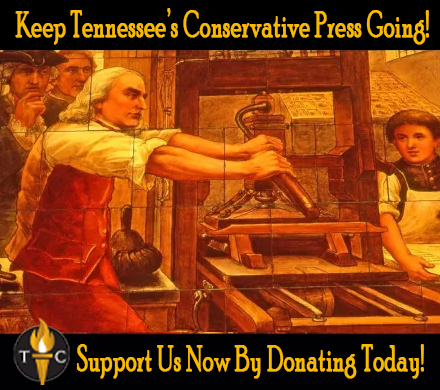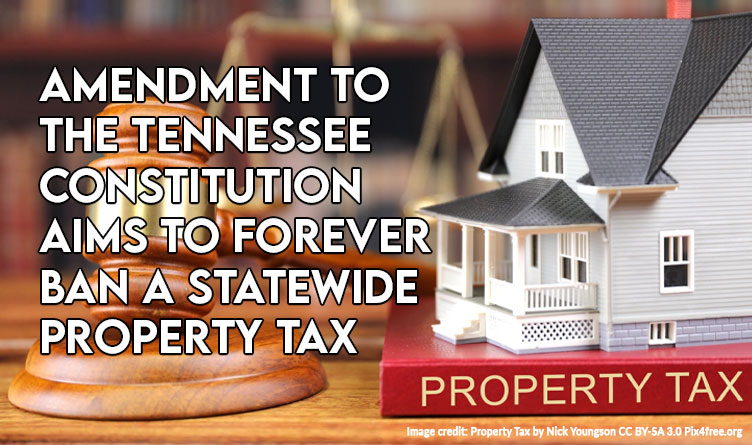Image Credit: Property Tax by Nick Youngson CC BY-SA 3.0 Pix4free.org
The Tennessee Conservative [By Jason Vaughn] –
Since 1949, Tennessee government has relied on sales tax as the primary source of funding. Prior to 1949, the state also relied on a statewide property tax. The state property tax went away but the empowering legislation did not. A proposed amendment to the Tennessee Constitution will address this by forever banning a statewide property tax in the Volunteer State.
According to Tori Venable of Americans for Prosperity Tennessee, due to the “left-over language” in the state Constitution, it would only take one bill to pass in the legislature to enact a state property tax that Tennesseans would have to pay on top of what they already pay in local property taxes.
“We already pay property taxes at the local level to counties & cities. These are the kind of tax hikes local taxpayers can fight or hold their elected officials accountable for.” Venable said.
If the legislature did pass a statewide property tax, Venable says that “it would be nearly impossible to repeal it or hold elected officials accountable if this were to happen.”

Venable states that the amendment to the state Constitution is a preemptive measure and says that, “Any challenges we receive from legislators will highlight exactly why we need to do it.”
For the amendment to the Tennessee Constitution to be enacted, it would first be required to pass the state Senate by a simple majority of 24, or both the House and Senate if it is a different bill than the one introduced in the 2023 session of the General Assembly.
In 2025, the same legislation will need to be passed through both chambers with a 2/3 majority.
Following, the constitutional amendment would be placed on the statewide ballot for voter’s approval in 2026.
Venable said she expects overwhelming approval on the ballot by Tennessee voters.
Rutherford County Tax Assessor Rob Mitchell said that the amendment has been a long-time coming.
“I sounded the alarm nearly eight years ago. To my knowledge there is not an assessor in the state that does not support this,” Mitchell said.
Mitchell states that the empowering statewide property tax legislation being left as is is “dangerous, inflationary and it is a real threat to housing affordability.”
Mitchell also suggests that Tennessee taxpayers contact Senator Bo Watson (R-Hixson-District 11), who is the chair of the Senate Finance, Ways and Means Committee, and express their support for the constitutional amendment.
Senator Bo Watson can be contacted at sen.bo.watson@capitol.tn.gov.
In an email, Mitchell gave a history of the state property tax and income tax in Tennessee that can be read in its entirety below.

Early Taxes in Tennessee: The State Property Tax and the Income Tax
Excerpts from “Taxation in Tennessee: 1796-1899 Prepared by Dr. Kevin Cason, Public Services, Tennessee State Library & Archives”
During early statehood and throughout the nineteenth century, Tennesseans were taxed on a variety of items. One of the major taxes during this period was the poll tax, paid by each adult free male in a household between the ages of twenty-one and fifty. While most Tennessee males paid a poll tax, there were some exemptions, i.e., ministers, men wounded in military service, or those with disabilities such as blindness or deafness. During the antebellum period, slave owners were taxed on the number of slaves they possessed—referred to on tax lists as a “black poll” (as opposed to a “white poll”). All slaves, male and female, between the ages of twelve and fifty were taxed.
After the Civil War, enslaved workers were emancipated and tax records reveal this change by combining the polls into “Every Taxable Poll.” During the 1890s and into the 1900s, Southern state legislatures began to make the payment of a poll tax voluntary, but if the person wished to vote he or she would have to pay the poll tax a year in advance of any election. Typically, the voters were asked to produce the receipt for payment of the tax at the time of voting. If they did not have evidence of paying the tax, they were prohibited from voting. Since many newly emancipated African-Americans and poor whites could not afford the poll tax fee, many were left out of the voting process.
The poll tax continued in Tennessee until 1953 when the Constitutional Convention of that year abolished it. In addition to the poll tax, another primary source of revenue in Tennessee was a tax on land. For many people during the early statehood and antebellum eras, land became the main source of wealth and farming remained the main occupation for most Tennesseans throughout the nineteenth century. The tax on land was based on the amount of acres, its location, and sometimes its quality. In addition to these factors, improvements made on the property, such as the construction of barns and other structures, generally increased the tax rate.
Prior to 1834, land in Tennessee was taxed at a uniform amount per acre; but in 1834 a provision was made to tax the land according to its value (ad valorem). Although poll and land taxes served as the main sources of revenue, other taxes were implemented that involved personal property. As more people began to acquire goods in the nineteenth century more items were taxed as Tennessee’s government expanded. Some of these items included billiard tables, wagons, entertainment shows such as circuses and vaudeville-type acts, and animals, especially stud horses. Each of these items was valued at a certain fee for the owner to pay. Although most items were taxed a specified fee, other items were taxed based on the population of the city or town. For example, in 1889 a theater in a city or town with 20,000 inhabitants or more was charged a tax of 400 dollars; in contrast, a theater in a city or town with a population between 8,000 to 20,000 inhabitants was taxed a fee of 250 dollars.
While some taxes were based on population quotas, other taxes were determined based on other criteria that made the tax fee differ for a similar item. For example, in 1855 a race track for turf racing was taxed 100 dollars, while a half mile track cost 50 dollars, and a quarter of a mile track cost 25 dollars. Tax fees were also different for people, such as peddlers, who sold goods. As the Acts of Tennessee show, peddlers in 1857 were charged a certain fee depending on how they sold their wares. If a peddler sold his merchandise on foot, he had to pay 10 dollars; however, if he sold his goods on horseback he had to pay a 20 dollar tax fee. Taxes also reflected the social and cultural values of the time period.
A prevailing negative social attitude towards alcohol seems to be reflected in the higher taxation of items associated with places where vices such as drinking liquor and gambling would occur. For example, billiard tables that were often found in taverns and saloons during the nineteenth century are charged a substantially higher fee compared to other items. In 1803, a billiard table had a tax fee of 1,000 dollars( equivalent to $26,222 in 2022) while owning a 100 acres of land was only 12½ cents( $3.41 in 2022). In addition to many taxable items, there were exemptions created for certain institutions in society. Some of the exemptions in the nineteenth century included land that was appropriated for the use of schools, as well as land held for any religious society for the purpose of having a church, meeting house, or other building of public worship. Tax exemptions also included all court houses, jails, poor houses and almshouses. In addition, public roads, streets and cemeteries were freed of taxation. Currently in Tennessee these exemptions have been afforded to tax exempt hospitals. A source of considerable concern as they compete directly with ”for profit” hospitals.)

Typically, the fees people owed were collected annually by a district tax collector/assessor appointed by the county court. In order to determine the tax districts, the court divided the county into specified numbered districts. These districts were designated by the names of the captains in the county militia and referred to as Captain’s Companies until 1836, at which time they then became known as Civil Districts. These early assessors were actually Captains of local militia. ( Which is why today the local property assessor is still charged today with keeping the county militia rolls.) After the collector deducted his fee, the money was then given to the county sheriff who, at the time, served as the county’s treasurer. The sheriff then subtracted his fee and forwarded the tax money to the state treasurer.
Since 1949 Tennessee has relied on the sales tax as her primary source of funding. Prior to 1949 the State also relied upon a statewide property tax. The state property tax went away, in practice, but not the empowering legislation. Currently in Tennessee property taxes are only assessed and collected at the local level.
The constant pull to raise revenues challenges government. Former Tennessee governors considered using the state property tax to raise revenue for state needs. The property tax is a very reliable source of revenue and places a lien against property. Advisors to the state leadership at the time suggested a state income tax as opposed to a property tax. Their reason being that tax exemptions could be built into an income tax system which would grant a more favorable treatment to wealthy landowners who tended to have more political influence. The Tennessee Constitution is very rigid and would not permit a legislative option for favorable treatment.
As of Jan 1st 2022 the total assessed value of taxable property in Tennessee was $247,527,784,225. A .50 cent state tax levy would generate an additional $ 1,237,638,921 in recurring state revenue. A value which is likely to increase as the value of property in Tennessee increases. How much more palatable might this be if it were used to fund the expansion of charter schools by way of offsetting the loss of local revenue to local school systems?
Reference material and sources: https://sos-prod.tnsosgovfiles.com/s3fs-public/document/taxation.pdf?VersionId=VfZiooGztXHT_ckS6QgUjP8QI_I.z.Af


About the Author: Jason Vaughn, Media Coordinator for The Tennessee Conservative ~ Jason previously worked for a legacy publishing company based in Crossville, TN in a variety of roles through his career. Most recently, he served as Deputy Director for their flagship publication. Prior, he was a freelance journalist writing articles that appeared in the Herald Citizen, the Crossville Chronicle and The Oracle among others. He graduated from Tennessee Technological University with a Bachelor’s in English-Journalism, with minors in Broadcast Journalism and History. Contact Jason at news@TennesseeConservativeNews.com



7 Responses
This is a loophole the progressives would jump on in a heartbeat. Keep Tennessee RED!!!!
We need to cease all this taxation. Taxes on alcohol is ridiculous and no one can tell me what it is used for and why there is such a tax. Is it a sin tax?
We need to ban all Property Tax and truly employment tax is unconstitutional….WE THE PEOPLE are taxed over and over and over again on the same monies we make. Taxed on food (which is a necessity and definitely should never be taxed), employment, buy a car, buy clothes, purchase a home and then taxed again when selling anything that already has been taxed, entertainment, lights, gas, water, garbage, gas for cars, for items we need…taxed, taxes, and more taxed and taxes…it never ends. This needs to cease and all be lowered. Never see anything being done with tax money that is truly positive. Need help with Mentally ill people and our Veterans. Giving away free healthcare to illegals need to cease. I could go on and on. To now want to add more taxes on property is ridiculous and not necessary.
Keep our STATE RED!!!!
We are already taxed to death. No state property tax!!!
As long as property taxes exist, you never truly own your property. You are leasing it. Because if you don’t pay property taxes, they can put a lien on your property and take it from you.
Which is so wrong. Our property is our property and you are spot on with your comment regarding property taxes. We also need to do away with food taxation and I want answers to the alcohol tax and NO ONE seems to know what and why.
Food is a necessity and income tax is truly Unconstitutional and needs to cease. The Taxation in our world has become to much on the AMERICAN, Legal citizens.
Taxes and high price of goods is way too high. The left will use it. Thanks and do away with is law!!!
I understand the need for taxes, I just think our government is out of control. I would love to see more details on where the money goes. Looking at our Federal Government (I understand this is not from Property Tax however it is from our taxes) sending billions to other countries tells me they are receiving more in taxes than they need to run our country. Going back to TN Property Taxes (city & state) why couldn’t the taxes be tied to the mortgage and stop when the mortgage is paid off? Retirees (or people 55+) should not have to pay taxes on a home they paid off.
As someone said above you NEVER really own your home.